

Medscape. Medscape. Medscape. New FREE CEU course for nursing professionals. Improving Outcomes in Oral Anticoagulation Therapy Management The aim of this course is to educate the participant about managing patients on warfarin therapy and how patient self testing can improve clinical outcomes and quality of life.
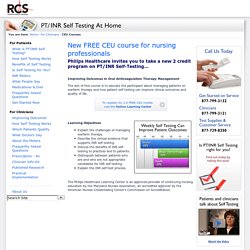
Learning Objectives Explain the challenges of managing warfarin therapy.Describe the clinical evidence that supports INR self testing.Discuss the benefits of INR self testing to practices and to patients.Distinguish between patients who are and who are not appropriate candidates for INR self testing.Explain the INR self-test process. The Philips Healthcare Learning Center is an approved provider of continuing nursing education by the Maryland Nurses Association, an accredited approver by the American Nurses Credentialing Center's Commission on Accreditation.
AHRQ Effective Health Care Program. The CME/CE activities listed below are offered by different credit providers, each having unique requirements for earning a credit certificate or a certificate of participation.
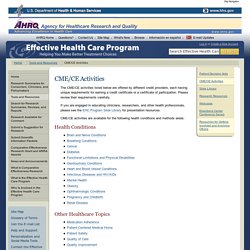
Please review their requirements carefully. If you are engaged in educating clinicians, researchers, and other health professionals, please see the EHC Program Slide Library for presentation resources. CME/CE activities are available for the following health conditions and methods areas: Brain and Nerve Conditions Breathing Conditions Cancer Diabetes Functional Limitations and Physical Disabilities Genitourinary Conditions Heart and Blood Vessel Conditions Infectious Diseases and HIV/AIDs Mental Health Obesity Ophthalmologic Conditions. Product. American Nurses Association Overview: The new era of payment systems, particularly through new Medicare systems, will challenge hospitals and nurses to innovate processes and care practices to achieve certain performance measures.
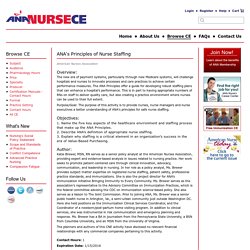
The ANA Principles offer a guide for developing robust staffing plans that can enhance a hospital’s performance. This is in part to having appropriate numbers of RNs on staff to deliver quality care, but also creating a practice environment where nurses can be used to their full extent. Caregiving For Patients With Heart Failure: Impact On Patient's Families. Learning Objectives At the completion of this program, you will be able to: Identify a positive and a negative effect of caregiving on the lives of family members who provide care to patients with heart failure.
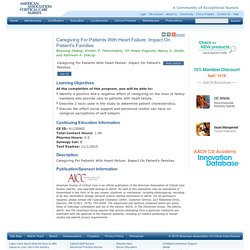
Describe 2 tools used in the study to determine patient characteristics.Discuss the effect social support and perceived control can have on caregiver perceptions of self-esteem. Parallel Paths to Improve Heart Failure Outcomes: Evidence Matters. Learning Objectives At the completion of this program, you will be able to: Explain the concept of “parallel paths” as it relates to improving outcomes in patients with heart failure.Describe the relationship between patients’ beliefs about their ability to control heart failure and their adherence to self-care behaviors.Discuss barriers to delivery of effective heart failure education for patients with advanced heart failure and ideas for improving patients’ accuracy of illness beliefs and their adherence to guideline-recommended heart failure self-care behaviors.
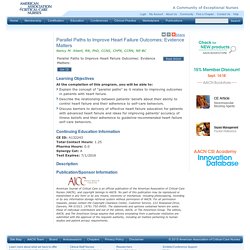
Continuing Education Information CE ID: A132243 Total Contact Hours: 1.25 Pharma Hours: 0.0 Synergy Cat: A Test Expires: 7/1/2016 Description. Managing Risk of Complications at Femoral Vascular Access Sites in Percutaneous Coronary Intervention. Learning Objectives At the completion of this program, you will be able to: Identify factors contributing to complications related to vascular access sitesDescribe the different types of anticoagulation used before, during, and after percutaneous coronary intervention Define the methods of attaining hemostasis in patients undergoing percutaneous coronary intervention patients Continuing Education Information CE ID: C1253 Total Contact Hours: 1.00 Pharma Hours: 0.25 Synergy Cat: A Test Expires: 10/1/2015 Description.
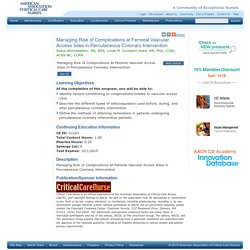
Fluid Management Strategies in Heart Failure. Learning Objectives.
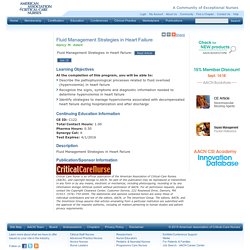
Efficacy and Safety of Pharmacological Options for Rate Control in Atrial Fibrillation. Learning Objectives At the completion of this program, you will be able to: Differentiate between the goals of rate control and rhythm control for atrial fibrillation.Discuss the rationale for lenient versus strict rate control in atrial fibrillation.Describe the role of digoxin, ßeta-blockers, and calcium channel blockers in the emergent and maintenance control of atrial fibrillation.
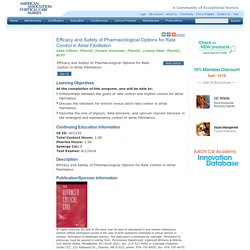
Continuing Education Information. Clots Kill: Hematologic Pharmacology for ST-Segment Elevation Myocardial Infarction. Learning Objectives At the completion of this program, you will be able to: Distinguish between the mechanisms of action of hematologic agents used in the treatment of ST-segment elevation myocardial infarction Differentiate between the pharmacodynamics of 2 classes of antiplatelet agents used in patients experiencing acute coronary syndromeState 3 benefits of giving educational handouts to patients receiving hematologic drugs Continuing Education Information CE ID: C1263 Total Contact Hours: 1.00 Pharma Hours: 0.75 Synergy Cat: A Test Expires: 12/1/2016 Description Clots Kill: Hematologic Pharmacology for ST-Segment Elevation Myocardial Infarction Publication/Sponsor Information Critical Care Nurse is an official publication of the American Association of Critical-Care Nurses (AACN), and copyright belongs to AACN.
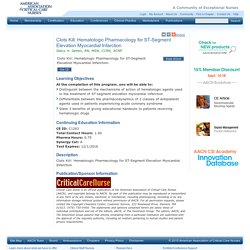
Depression Screening: Utility of The Patient Health Questionnaire in Patients with Acute Coronary Syndrome. Learning Objectives At the completion of this program, you will be able to: Identify the need for depression screening in patients with acute coronary syndrome.Describe 2 hypotheses for the study and their role in the study design and methods.Compare and contrast 3 versions of the Patient Health Questionnaire and their reliability for use as a depression screening tool.
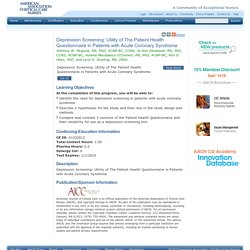
Aortic Stenosis: Pathophysiology, Diagnosis, and Medical Management of Nonsurgical Patients. Plasmapheresis in the Management of Severe Hypertriglyceridemia. Learning Objectives At the completion of this program, you will be able to: Describe use of plasmapheresis for the management of severe hypertriglyceridemiaIdentify conventional therapeutic modalities used for management of hypertriglyceridemiaDiscuss effects of hypertriglyceridemia on clinical laboratory tests Continuing Education Information CE ID: C1342 Total Contact Hours: 1.00 Pharma Hours: 0.0 Synergy Cat: A Test Expires: 8/1/2016 Description Publication/Sponsor Information.
Destination to Nowhere: A New Look at Aggressive Treatment for Heart Failure—A Case Study. Learning Objectives At the completion of this program, you will be able to: State the role of palliative care in an intensive care unit settingIdentify measures to manage moral distressState the importance of preparedness planning Continuing Education Information CE ID: C1422 Total Contact Hours: 1.00 Pharma Hours: 0.0 Synergy Cat: B Test Expires: 4/1/2017 Description. Discharge Outcome in Adults Treated with Extracorporeal Membrane Oxygenation. Learning Objectives At the completion of this program, you will be able to: Describe the medical indications for the use of extracorporeal membrane oxygenation (ECMO).Identify the complications associated with the therapy of ECMO therapy.Discuss the outcomes associated with the therapy of ECMO therapy.
Differences in Alarm Events between Disposable and Reusable Electrocardiography Lead Wires. Learning Objectives At the completion of this program, you will be able to: Compare and contrast the use of disposable and reusable electrocardiographic (ECG) lead wires (LW) and their effect on alarm events.Describe effects of false ECG alarms on the patient and caregivers.Identify additional research needed to further explore the effects of ECG alarm management.
Stroke Volume Optimization: The New Hemodynamic Algorithm. Computer-Assisted Interventions to Improve QTc Documentation In Hospital Patients Receiving. Standards for Resuscitation After Cardiac Surgery. Ventricular Assist Devices: What Intensive Care Unit Nurses Need to Know About Postoperative Management. Learning Objectives At the completion of this program, you will be able to: Discuss the role of ventricular assist devices in the treatment of patients with end-stage heart failure.Differentiate between pulsatile and nonpulsatile pumps.Recognize the potential complications associated with ventricular assist device implantation. Patients Who Refuse Blood. Are the Core Measures for Heart Failure a Part of Your Practice? Time to Measure Up to The Joint Commission’s AMI Core Measures. Surgical Adhesions. Vasoactive Drugs in the OR: Ensuring Patients’ Safety. Reducing the Risk of Surgical Site Infections With the Surgical Care Improvement Project.
Balancing Act. Sepsis. Safety First. Align Your Sight on the Line. How to Understand a Chest X-Ray, Part 2. How to Read a Chest X-Ray, Part 1. Ensuring Evidence-Based Practice in Critical Care. Mechanical Ventilation and Weaning. Pulseless Electrical Activity. Vancomycin-Resistant Enterococci: The Battle Goes On. Evidence-Based Practice for ICU Sedation, Central Line Infections and Early Feeding. Pulmonary Emboli — Small But Deadly Blockage. To Air is Human. Shock States. Treatment and Prevention of Anemia of Critical Illness. Adverse Drug Events. Perioperative Nurses Lead the Way in Managing Surgical Patients’ Skin Integrity. Promoting a Culture of Safety to Prevent Medical Errors.
Administration of Moderate Sedation/Analgesia. Anticoagulant Overdoses Prompt Joint Commission to Issue Safety Requirement. Blood Test, Drugs Boost Success in Managing Heart Failure. Noninvasive Positive Pressure Ventilation Requires Healthcare Team Spirit. Warfarin Basics. MRSA May Be Waiting Right Around the Corner. Wounds‚ Part 1. Wounds‚ Part 2.